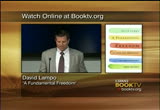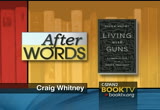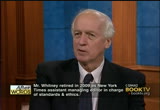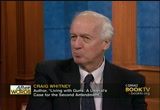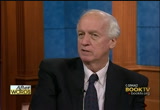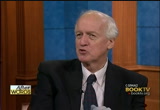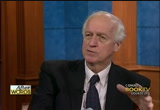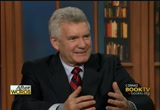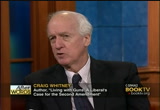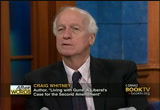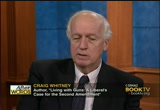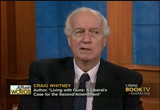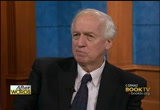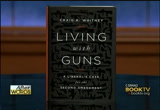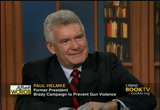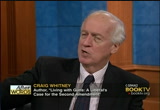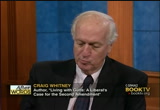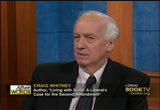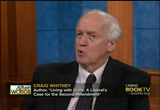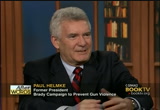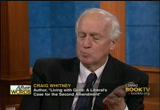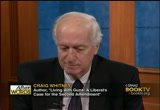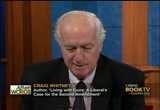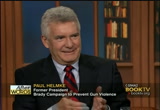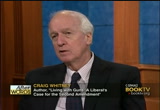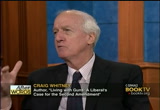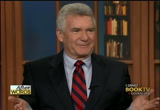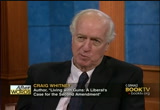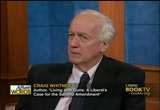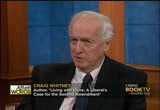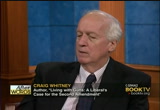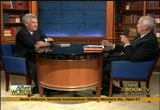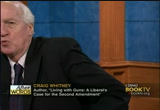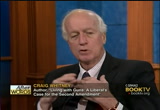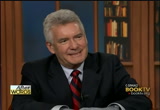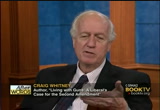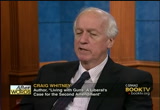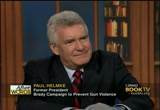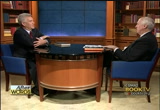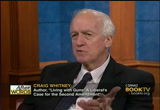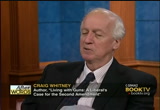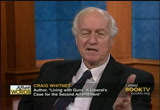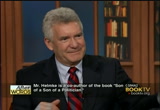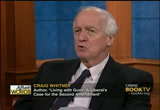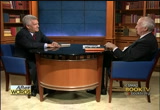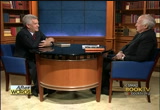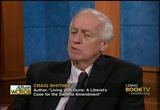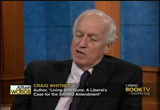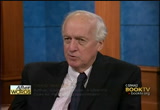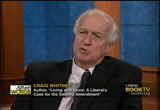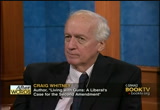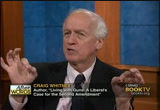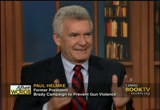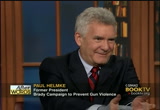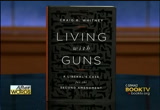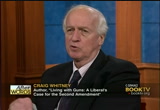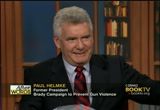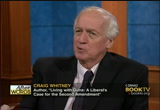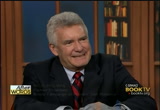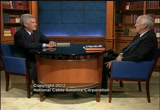tv Book TV After Words CSPAN December 23, 2012 9:00pm-10:00pm EST
9:00 pm
9:01 pm
reporter around the world. you are a specialist, you've written a book on organ music. living with guns. how did you come to this topic? >> guest: precisely because i had lived abroad for so many years. i would often be asked by friends in those countries what is it with the united states and americans and guns? why do you have such a love affair with guns is the way some of them sometimes put it, and i do my best to explain but i realize that i didn't really know myself, so i thought when i retired when i had time i would try to do some research and find out why do we have the second amendment and how has it been understood during all of the year is that it's been influenced and the book was a
9:02 pm
result. >> host: you cover the history, the legal battles, you cover what is going on in the current day. let's cover that and starting with the history what surprised you most when you look at american history and salles the roll with the guns plead or didn't play. >> i grew up in massachusetts in the 50's and of course we always made a big thing of thanksgiving and squanto and so on and the way the story ran in the schools when is the pilgrims came and they were very friendly with the indians and they celebrated the first thanksgiving keefe you read the history of even the colonies in massachusetts and you find that the native americans and the english settler said that came in or anything but friendly most of the time so you have the
9:03 pm
massacre on both sides and the tremendous cost of the. understandable because they thought the land belonged to them and lo and behold -- >> host: the to get away. >> guest: but that is certainly what surprised me. i know that there have been some questions raised by the historians of the colonists had as many guns as people nowadays say they do you find that guns are important. if he were a white male over the age of 18, you were practically required to have a firearm and to produce it when called upon to defend george town or community or state. >> host: is a decision the came from britain or just anyplace overseas to take the risk across the ocean? >> guest: they have firearms for self-defense and the
9:04 pm
purposes and that right common law right the colonists the needed the guns here whereas most england they didn't, and so people soon came to have an enormous facility and knowledge of firearms and of course as we all know it proves the result of victory against the most powerful military country in the world with of the revolutionary war. >> host: i want to talk about that a little bit, and again i think people get different views in history, and it comes from movies or tv a lot of times. but when we have the revolutionary period what was the role of guns in the militia or these requirements that we talk about? >> guest: george washington didn't think a lot of the militia. he growled about a lot of times but also made some remarks that
9:05 pm
aloud how the militia was a useful thing to have. they could have built the continental army with the existence of the militia and people that have been in the militia and more importantly the volunteers and others who knew how to use firearms, and that was the key. >> host: so people were using these on the frontier protecting the indians, native americans, hunting certainly, and then in the colony's some sense of responsibility for the common good. >> guest: right. the common law right to have the firearms came with a civic duty to use them when called upon. >> host: who was in charge of these? >> guest: local commanders, towns. later on became more broadbased, but as tensions and hostility is mounted between the british authorities and the colonists in
9:06 pm
approach to the revolutionary war, it was seen by many of the leaders of the time has an advantage that we americans knew how to use firearms. >> host: at this time was there organized law enforcement or was it this group of volunteers on was that all law enforcement? >> guest: depends on the size of the town but there were not armed policemen in the places like boston, philadelphia, but sure it was mostly locally based azzaoui understand it on the proven revolutionary history, but it was, it certainly was a sense of duty to serve when you were called upon. >> host: lexington, concord, 1875 everybody knows a little about that, but one thing your book touches on this a little
9:07 pm
bit but still confusing to me the british were actually marching on the armory because of all of the guns and the ammunition i assume were stored at the armory, the common in effect communal place for the guns and the ammunition. they were marching there and that is went paul revere went to. >> guest: the minutemen came out and tried to resist them and did successfully. >> host: in my mind the armory talks about out how this is a common use. >> guest: it isn't necessarily a contradiction. for instance, if you didn't have a gun and should have had one according to the militia requirements in one of these towns the town with a sometimes provided to you. they would then -- in a sense it
9:08 pm
was private property even if they assigned the weapon, but sure, being the militia, they needed to keep a supply of firearms and ammunition for those occasions when lots of force was needed to deal with an indian attack or whenever it was, and so they did have storage in the armories. >> host: but even back then there were restrictions and regulations for the usage of guns. >> guest: to take a step further from the armories and if there were armories, there were also the lists of militiamen so they knew who was in the militia and therefore who had guns and what kind of guns. so when you are here today people resist the idea of any kind of registry or firearms. they had it in the colonies on local level it's always been with us, some kind of regulation.
9:09 pm
>> host: so we go from this history to the revolutionary war is successful trying to form a country, we of the articles of the confederation, that government is too weak so we are starting to write the constitution. this is where the second amendment obviously comes. how did this all develop? >> guest: nowadays it's become fashionable among the people that support them rights strongly to pick out this or that quotation from that leader like samuel adams or thomas jefferson or whoever and implied that in the second amendment is basically seen as a rate of the individuals to defend themselves and defend themselves against the government when it became tyrannical. that is a misunderstanding. it was a political matter in the second amendment. it was a part of what became the bill of rights, and the reason for it is that when -- after the unhappy experience of the articles of the confederation
9:10 pm
led the founders to try to figure out a better way of governing this country, they came up with a constitution that is full of checks and balances, but as it was submitted to the states for the ratification it became clear that they might not get the nine states they needed unless there were promises of still more controls over the potential of the federal red overstepping its powers and crushing the states which is of the object. so, the agreement was to come up with a set of amendments to. and as -- to make that the first order of business when the congress can be -- with that promise they did get the nine states to ratify, and it went into effect and the congress met, and indeed the first thing they started discussing with amendments, and to make a long story short, instead of sprinkling them into this or
9:11 pm
that provision of the articles of the constitution the internet as the bill of rights and when the second amendment was one of them the wording of it indicates that it didn't create anything new it simply recognized the rights and connected it with the political reason which is to ensure the states could keep their militia even if the federal government had a standing army which everybody at the time felt would be the worst be possible. that could lead to tyranny and this was seen as a check against that kind of tierney it had a deterrent if you will of the tyrannical federal leader who could try to take over the country. crusco was there any discussion of self-defense or -- >> guest: the amendment itself doesn't say anything about self-defense. it simply says the well
9:12 pm
regulated militia being necessary to be defensive of the free state, the right in other words the existing right already shall not be infringed. >> host: a lot of arguments over that. in terms of the tyrannical government, what did the founders seem to be thinking of? king george again or something -- >> guest: of course they were coming out of the experience of the war against the british so the attempt to impose tyranny with the british army was in their minds but they had been through the few years of the confederation. >> host: they had some trouble getting the troops to answer the call to go fight, so they thought you will see and
9:13 pm
quotations especially from john adams who makes it clear they were not trying to create a situation where individuals who didn't like the federal government could hold up an arsenal somewhere and hold off. that's not the way the founders saw. they saw this starkly as a means of preserving the state to keep their militias. john adams says at one point that the militia is always subservient to the state. it's not a rebellious -- >> host: it's a well regulated and something that ties into the said that even after the constitution is adopted in washington is an office, you have the whiskey tax and the whiskey rebellion. how did they respond to that? >> guest: that went better than fever billion did.
9:14 pm
but, they recognized the need strong federal government the need to be these checks that would ensure that the states kept power as well. >> host: over time than during the 1800's were the rest of the 1800's, the -- during the 1900's we continue to have guns play a role in the society particularly in the frontier any surprises that he founded study in that era? >> guest: the means of price to me is gun control in the wild west i grew up with westernism in the 50's and well in reality you couldn't carry a gun around in the town like dodge city is a good example. there were walls against that. if you are a cowboy that came in when you were supposed to go
9:15 pm
story or pistol if you had one. >> host: that doesn't fit with the way that most people think about it. >> guest: this is of course settlements out in the wild prairie, but they are like towns everywhere today. you need to call and order in the towns and it's hard to keep that up. >> host: even the shootout at the corral was a starting point. >> guest: clams and i think it was had been arrested or accused of violating below will ordinance and forbade carrying a local firearm. incidentally the understanding of what gun rights were for beginning to evolve in the 19th century, and in particular in the south in the early 19th century it was a big problem with duals the most famous one
9:16 pm
is aaron burr and hamilton, but this was fairly common but it was frowned upon and it can be prosecuted and he had to keep moving around to avoid being prosecuted, so but one of the names of people who insisted on the spot started to do in the 19th century is carried pistols concealed if was seen by a gentleman as cowardly and don't sneakily carry it around inside your coat, so you know, that began to change. >> host: and it's actually it still holds true today most places don't have any restrictions on openly carrying
9:17 pm
guns which most people of realize that there are places that do have restrictions on them but it goes back to that sort of historical sense that was the guy with a concealed gun whereas if you're if you had it in your holster. >> guest: they have no rules practically about that. but anyway, the -- >> host: then you had the foothills -- slave issue. >> guest: and the whites in the south some of them began to see personal firearms as a means of defending themselves against slavery if they needed to. later on as we approached the civil war and abolition became a strong movement the abolitionists wanted to provide
9:18 pm
guns to the supporters of the north's leader in kansas and vice versa, so they wanted to supply arms to the abolitionist so they could defend themselves against attacks by their opponents. after the war the ku klux klan and groups like that the rose and they were persecuting friedman and the blacks began to look for ways to defend themselves, the federal government tried to institute new state militias in the southern states and whites wouldn't serve and they saw them as a way of self-defense. >> host: what was the legal understanding in those times? when there were restrictions they consider that unconstitutional or was that just a political battle to be fought with their it is in an urban area or a city on the frontier that is trying to get its act together? >> guest: of the the court
9:19 pm
didn't have enough to say about them except in the state courts where for the most part the early rulings in the lower federal courts supported the right and saw it as not a right that belonged to criminals but to be used for criminal purposes, but more as a rate that is in a connection with the civic duty. but the supreme court didn't say anything about the second amendment for about a century. they mentioned it briefly in the ruling in 1870's six, and that was out of a horrible massacre in the reconstruction period with 100 or more blacks had tried to defend themselves in
9:20 pm
louisiana and were attacked by the crowd that the federal government attempted to prosecute the attackers on the ground they had deprived that were killed of their amendment. and the speaker didn't find that there was the case. they said at that time we didn't see that there was any racial motivation at all to deprive blacks rights specifically and in a kind of a site the ruling said the right to keep and bear arms was and a right granted by the constitution, it was a pre-existing right and so if there was any application the courts later extended from that to say if it applied to anybody it was to the federal government
9:21 pm
simply the limitation on the federal government said it would be too -- >> host: that is almost of the bill of rights was interpreted by the courts it only applied to the federal government unless it was specifically incorporated to the states. >> guest: and we didn't get the corporation of course until 2010 to the follow-up decision to the chicago case. >> host: what about in the 1900's then. we have the prohibition era, we've got john dillinger, machine guns -- >> guest: prohibition produced organized-crime and eliot ness and all that and actually the first real federal gun control measure that came into effect was as a result of that in the 1934 firearms.
9:22 pm
>> guest: exactly and that was upheld in 1939 by the supreme court miller case where somebody had challenged the application of how could he be denied the right to have a machine gun and the supreme court said unless you can demonstrate this relationship between them having the machine gun and private hands and the preservation of a well regulated militia it doesn't seem to have any application. that ruling was long interpreted to mean that the supreme court of there was no individual right to have firearms, that you had to be in some kind of a relationship or the national guard or the military to exercise. guest co-host for 1938 is a long time ago and that is all of the land until 2008. what changed in that time?
9:23 pm
>> guest: incidentally the firearms act still but -- >> host: just as an aside always pointed that out that shows no gun control and work you've seen anything kroger's with machine guns anymore. the dividend machine gun with a serious restrictions on them and it seems to have worked. >> guest: all are horrible gunned massacres none of them has been with a fully automatic weapon. but, -- >> host: what happened? >> guest: well you have the firearms act and then importantly, the 1960's happened and all of the racial and social turbulence of the 60's and the assassinations of president kennedy, his brother, martin luther king eventually produced a gun control act, the 1968 gun control act. there was support for that even in the leadership of the nra at
9:24 pm
the time, and charlton heston even subscribed to a statement was read by another hollywood tough-guy calling for some kind of regulation to prevent this repetition of these crimes as horrible as the assassinations, but a lot of gun control measures to support them in california, ronald reagan supported the gun control measure because the black panthers were run around with guns and state legislature in sacramento. >> guest: they pass a law that made it hard or impossible to do that and the rating period on the time he needed to reapply for a handgun and actually being able to buy at and people said well, that will certainly stop the black panthers that doesn't apply just to the black panthers. it applies to everybody. will eventually you get a backlash, and there was the
9:25 pm
social and political backlash to a lot of the things that happened and i think gun-control was one of them. >> host: but the act dealt mainly with a list of prohibitive purchases. so, it wasn't saying if you are if felon or habitual drug user or dishonorably discharged or mentally dangerous the use different terminology but they went through a list of about eight or nine sections of people that shouldn't be able to buy guns. >> guest: but at that time it was -- it took a long time to do those checks and eventually the was replaced by the system we have now that is automated under the if the guy runs the national instant check system. >> host: the way that worked as through the 25 year period is that it affected the honor system to the u.n. in to buy a
9:26 pm
gun and they said you get to buy your gun. >> host: it would allow people to lie and get away with it, absolutely. and that wasn't changed and that is when the leader came in. >> host: said they were supporting things in the 68 act, the other prominent republicans supporting at, when did they change and how did that mind set become different? >> guest: etkin as a surprise to me to learn how they were originally founded by the former "new york times" reporters. but what they were concerned about is being prepared for the national defense like the first world war and making sure that we have enough people in the country and how to use firearms so that we wouldn't be defeated if it came to a war.
9:27 pm
>> host: when i was going about my nra marksmanship badges i kept those badges. was a sort of private. >> guest: they still do a lot of worthwhile training and the ability to use firearms safely, but they became politically the leadership that had proven the gun control act was overthrown and replaced by others and eventually charlton heston became a spokesman for that action and now we have been firmly in the saddle, and politically it is a very different organization from what it was in 1968 very clearly. it's also been able to raise huge amounts of money and become maybe the most powerful lobby here in washington. and it plays basically on the backlash on people's fear of
9:28 pm
crime is rising and the police can't do anything about it, then how are we going to keep ourselves from being robbed and murdered, raped, salon? we need firearms to defend ourselves and they have certainly been playing on that for many years. >> host: but as the crime is rising and crack cocaine and the games and the sophisticated guns, the congress acted again. only the third time they acted to gun control. with a the brady bill and the assault weapon ban. how does that fit in? >> guest: well, you had the attempted assassination of president ronald reagan. it took him ten years to come around to supporting a stronger. he did of course in the brady bill, and he wrote an op-ed in
9:29 pm
"the new york times" which insure everybody has forgotten about but it's in the book saying we need some kind of measure like the one i signed when i was governor of california that makes people go through a waiting period before they can acquire a handgun and i think the assault weapons ban which came out a little later was more emotional than that. if you look at the violent crime committed with guns in our cities today, these assault weapons that look like the m-16 or the ak-47 didn't figure in those importantly. those are mostly handguns or pistols. assault weapons look scary and i
9:30 pm
think they are easy to scare people about. they have figured of course in the gun massacres like aurora and others but even those are just committed with semiautomatic pistols and a large capacity of magazines which was part of the assault weapons ban. >> host: a lot of people probably don't understand the difference to the semi-automatic, the fully automatic and the single shot pistol. >> guest: they pulled the trigger in as much time it fires a bullet and when it comes into the chamber and you are ready to fire again the same with a semi-automatic pistol and a semi-automatic assault weapon the to to squeeze the trigger each time and squeeze fast. we can squeeze past. host with a fully automatic you
9:31 pm
just told a backend with this you have to twist. >> guest: if you have a magazine, 100 rounds shooting in the aurora massacre in the movie theater that man episode you get a lot although his magazine jammed, so he couldn't get off of the 100 rounds. coast collect the tucson shooter with gabbie giffords keogh kosoff in 15 seconds. >> guest: then he was -- >> host: he went to reload. >> guest: so i'm -- >> host: so we had an assault weapon ban and ten years later -- >> guest: when the momentum behind keeping the ban ran out and president bush was in office instead of bill clinton, so we have at. now there may be some move to rethink it. i found in doing research on the
9:32 pm
look that violent gun crime didn't go down significantly during the period when the automatic weapons assault weapons ban was in effect that doesn't prove it had no effect but statistically -- >> host: there are arguments about that. part of it is that it band new sales but you were allowed to keep old ones so there's a stock of weapons so that you look at the period of years. >> host: but would probably have the same grandfather clauses about the purchase, so how effective what it really be? i think a lot of times liberals -- and i call the book a little case for the sake of the amendment make the mistake of thinking strict gun control that's the way that you control gun violence. that's the best way to control gun violence i think if you could eliminate all 300 million guns that we have in this country legally or illegal
9:33 pm
surely gun violence would go down, but we are not clear to be able to do that, and instead what happens is in the places in new york where i live, overwhelmingly the support to make it as difficult as possible for everybody to buy guns legally this seen as the best way to keep the gun violence down what doesn't work because criminals don't bother with getting a license or registering their guns. they acquire them illegal so the way to try to control that come and will never be impossible to eliminate is i think to a month gun-control measures that preventing people who shouldn't have guns, not people who ought to have the right and do according to the second amendment. >> host: before we get into those solutions and i want to discuss those in detail because we kind of skipped over the ruling and the mcdonald ruling
9:34 pm
so where does the second amendment stand? i know you said in your book that you agreed with the decision in the 2008 decision by justice scalia that said there's an individual right unrelated, but you felt they came up with a result for the wrong reason. >> guest: i do agree that is an individual right and i think history shows that, but with the decision says is first of all it is inconsistent it is quoting her the decision as we have said, the supreme court said previously it's not a right granted by the constitution. a few paragraphs later the conferred the right how can they not be granted by the constitution and the second amendment confers the right and he says it was primarily about self-defense. well, no where in the debate about the second amendment back in the 18th-century to you find much emphasis on the individual
9:35 pm
self-defense as we said previously that isn't the reason for. that is the reason why the second amendment was written and put into the bill of rights the reasoning is -- did it suspicious but it is an individual right 71 do you do? scalia doesn't say that doesn't mean that it cannot be regulated. >> host: it is not unlimited like where you can't take guns into schools and that kind of thing where they take guns on how they are sold and stored and even some of what kind of guns they are. that ruling was basically extended to the states in 2010 and the chicago case and mcdonald was a black man that wanted to have a firearm.
9:36 pm
>> host: he legally had a shotgun. he wanted to have a pistol and couldn't because chicago had a strict laws like the one in the district and the court found in the 2010 that had to go just like the rule and the redistricting of handcuffs. >> host: one thing i think in this day and age you can make an argument or a valid question is what difference did that really make except in d.c. and chicago the and nobody was rushing out to pass new gun control laws. mayor bloomberg of new york, hillary clinton, barack obama all said that it was an individual right. 75% of the american people thought it was an individual right including those liberal politicians thought it was. other than getting rid of the d.c. law and the chicago law what difference did it make? >> guest: that's interesting. to me that as a surprise because a lot of gun control but it said
9:37 pm
tougher with of those decisions that there would probably be a tsunami i think was the word the was used of challenges to gun control regulations. well, they're have been some, but there's certainly not in a tidal wave of them and they haven't mostly succeeded here in the district. the past and decided on a new set of regulations the still band the assault weapons and make it necessary you have to show that you know how to use a gun and can store it safely and have to register it and so on, and the -- there is a challenge to that that i don't think has been resolved yet. >> host: i know of at least a couple hundred lawsuits in the country and they move slowly but still almost every one of the has upheld the law. >> guest: it doesn't seem to be a tidal wave among the judges
9:38 pm
to overthrow gun-control regulations just because of heller and mcdonald. >> host: succumbing you've got this new definition of the second amendment, and again, one level i thought was like are giving companies angels can dance on the head of the pen the real issue is are there things that we can do to help make our communities safer? i came at the issue has a mayor and 14 indiana we had rising crime and strengthening the police report what pushing for the stronger law but also realizing we made it dangerous for people to get guns and sometimes they were outbidding the police department, so i knew that sort of fits in to where you have gone with the book, too. >> guest: what we need to do is have that kind of discussion. instead what usually happens after an atrocity light aurora is politicians on all sides that for the violence and the deaths and then we move on and we need
9:39 pm
for -- we wait for the next one to be the new york city mayor bloomberg of course is one of the heads of the mayor against illegal guns which the nra has described as its worst enemy. they started in 06 with about 500 plus. >> guest: there is a gun violence problem in the country, and nobody can deny it and unfortunately nobody's really talking very much about what can be done constitutionally and legally to make it less violent, less prevailing as it is now and that is what we need to do. obama and romney can close, they touched on it and that the date and there was common ground they found which my former newspaper at the times dismissed as sort of meaningless, well let's not meaningless if you are going to change the way because people
9:40 pm
commit gun violence, not the guns themselves, how do you get at the feeder that leads people to resort to guns and troubled neighborhoods in the city's and new york there are communities people's - and fire hydrants were street lamps well, you could do something like that, you could pass a law and impose a kettle heavy penalty. they raised the minimum sentence for having a loaded illegal gun on you to three and a half years i think you could raise it even higher and that might make it clean to people that provide guns illegal to people that might buy them because their names are on that list in washington and in west virginia in the list. >> host: and that is the list
9:41 pm
that is access when you do a background check. >> guest: criminals get around that by not getting someone else to buy a gun for them. that is another thing i think ought to be changed. it isn't just gun shows where you can buy a gun from a private seller without going through the background check system. but all -- is about 40% of the total gun sales are conducted without a background check because you are not buying from a federal licensed dealer. >> host: i think it's important because one of the barriers to a discussion is a lot of folks don't know how they work and one of the things i always try to point out is clearly we don't have that many, quote, gun-control lobby is on the books other than restrictions on foley automatics >> guest: federal ones. >> host: that the not that many of the state level better that much different than at sea of the restrictions of all the
9:42 pm
automatics into the prohibited purchasers and the requirement to do the background check by the federal licensed dealer. that is basically it. and that means that if you are buying from a so-called -- if you're buying for your next-door neighbor they don't have to do a background check. >> guest: that's outrageous. host but becomes a private seller exception that is often exploited in the gun shows somebody will set up week after week after week and so the 100 guns and they never do a background check. >> guest: and they are fiercely opposed to it. >> host: why would they oppose that? >> guest: it is any kind of a restriction on the unfettered freedom to own or use of gun. >> host: it should be constitutional, shouldn't it? >> guest: i can't imagine that -- sure, they have upheld the system itself is just a loophole that doesn't apply to the private sales. but, i think that's certainly one area that you could find common ground. how can the nra in pos really
9:43 pm
convincingly regulations aimed at keeping people like criminals and drug addict from acquiring guns? there's nothing that has tried to support people like that the nra is the only one that says don't make new gun control measures, and forceful law that we have against criminals and that should be something we can agree on. >> host: part of what is needed to enforce those are maybe stronger definitions sometimes were stronger regulations but the list of prohibited purchasers from 1968 says drug users promises to our that -- drug addict but it doesn't define how you treat that. if anyone would ever used drugs in this company as a prohibited purchaser had a lot less guns available. the mentally ill is the major one. >> guest: that is a similar issue to recognize the sensitivity. i know people like myself that
9:44 pm
have had problems and dealt with them and a blanket prohibition against having a gun is something you want to think about very carefully. >> host: but that isn't what most people are talking about to be that virginia tech when the brady center discovered that the court in virginia had found him to be in danger to himself or others but that the state of virginia had and send that information in because he hadn't been ordered -- he wasn't committed then you know that shows a major loophole and they actually found after that that new york state have only sent like four names of people that were dangerously mentally ill and my home state of indiana bit didn't make any sense at all. yes, they did tighten up procedures. >> host: in the federal level the bill was passed, too there was a gun control bill passed in 07 that was signed by president bush and 08 that gave incentives
9:45 pm
to the states to put the records in the records that have come in. >> guest: i don't know how much compliance there has been the effectively. chuck schumer senator from new york keeps trying to withhold money from the state's in the various purposes and provide more names to these lists. >> host: i've always looked at sort of the issues are cleaning up on having a stronger background check system to make it harder for people but we all agree are dangerous from getting guns should be the way that we are going and your book argues that punitive part of your book gets into having a better definition of who is dangerous and making sure those records are in the system and then requiring that background check on all of the sales. >> guest: but to get to that you have to get past the sort of hysteria that the other groups have created in the state legislatures and in the congress where they practically have a stranglehold or any kind of a discussion on issues like this i
9:46 pm
think the legislators ought to think twice before they pass measures that basically enable people to kill other people more easily. let the jury decide what happens there. but he passed law that makes it easier to kill people well, criminals can to get in touch of that, too, not just you that happens to think that you are in danger of being attacked by somebody with a gun. i just think it is shameful that we have rushed to passed the standard ground and castle dr. laws. >> host: basically there's always been a right to self-defense and we recognize that right to self-defense but what they do in so many cases is take away the discretion of the prosecutor to charge. >> guest: whose interest does that serve? one of the things that did surprise me a little and i didn't conduct a nationwide survey of the gun owners but
9:47 pm
among the people that own guns that i talked with, i found that very often the reaction coming your way of thinking before and after you have a gun is very different. i think any law-abiding gun owner realizes when he or she has a gun that it's a huge responsibility. if you use this weapon irresponsibly, you can get yourself into a little trouble. you can cause unnecessary misery and death to people you didn't intend to do harm to. it makes you very careful. it should meet you very careful, and for most people it does but it would make people more careful if they all had to pass some kind of a test before they get a license to buy. you don't always have to with
9:48 pm
most guns. >> host: one of the weakness is i felt in your book, and was dealing with the consequences of a gun violence and you touch on this some, but 12,000 people murdered with guns every year and another 18,000 commit suicide with guns every year i even mentioned to someone that living with guns they said shouldn't be living and dying with guns, you know, you talk with people that enjoy hunting and people at gun shows that are gun enthusiasts. i don't think you talk to anybody in the book that had been direct victims. >> guest: the brady campaign has done so much to give people a voice. i hadn't done anything to ignore the problem, let it -- if you look at the 30,000 roughly in your figure of people who died, there are of course many thousands more who are injured by guns every year, but you know, half of them are suicides.
9:49 pm
the gun violence rate in this country is very high as those that have strict gun control, but are fatal assault rate is higher excluding guns than most european countries in putting guns. america is a more violent prone society than any european one today than in our history and our mentality but yesterday thousand is way too many and we ought to be discussing as many as we can to bring it down and we are not gentry eliminate it entirely of. host could you talk about strengthening the background
9:50 pm
check system and the strict penalties and we cover both of those. you mentioned licensing and registration. we touched on that briefly, but that is something that those generally get people's attention. how would you suggest we look at that? >> guest: i would go back to the history and people ought to look at that and say we have always had a gun registration. it's just been on the local level. i think the second amendment and the court decision surrounding at probably makes it clear that the federal government shouldn't be the agency that registers guns. in fact the law that congress has passed, but there are some states that forbid the registering of guns. why is that? it is and a historical thing. it's part of the hysteria created by the extreme gun rights groups about any kind of gun regulation that is the first step toward seizing your guns and destroying your freedom to own and use firearms.
9:51 pm
but it's not. it's a sensible, you register cars and they can tell people, too. their primary purpose isn't to tell people unlike it is a primary purpose of handguns. >> host: i've always thought the handgun -- if i'm going to sell my car to my next for neighbor i can't just sell the car to him, he's still got to go through the government of people were to transfer the official title to the car and he has to be licensed driver and they have to be registered. if i get in an accident with the car someone is going to analyze why the accident happened and whether it is eventually whether we need the strict rules on drunk driving or destructive driving or text in driving or were the roads faulty, was the car at fault? those were all things we looked at with auto accidents and going from the individual responsibility to the design of the car and the design of the roads.
9:52 pm
but with guns -- >> guest: there's even a congressional law that forbids the federal government from regulating the way the guns were to make sure that they operate safely. >> host: how does that make sense? >> guest: it doesn't. if you drop the gun it shouldn't go off easily. >> host: sometimes without the person they do kill people, too. >> guest: i don't even see what the federal regulation rules are that apply to the gun manufacturers to make it safer to operate the guns. there is no threat to the second amendment if it should happen but right now it is barred. >> host: it amazes me -- i don't think people realize this that the center for disease control is restricted on what they can look into in terms of gun violence and the national student health has restricted what they can look into and the alcohol tobacco firearms is restricted in terms of what records it can keep and all of
9:53 pm
you assume -- >> guest: the law enforcement does nothing to reduce gun violence. >> host: mr. to get tobacco costs we have the surgeon general's and the lawsuits on gun manufacturers. guesstimates irresponsible and i think it is unthinkable and i would hope that we would be able to start talking intelligently about our gun violence problem and not fall back into the hysteria about well, gun control means you're taking the freedom to have guns away. no, how do you have done is and use them safely? >> host: is the book everest to liberals or gun owners or is it addressed to our elected officials? >> guest: to anybody that reads it i hope, but certainly i find a lot of my liberal friends
9:54 pm
and think we can say this about me your bloomberg come he is so preoccupied with the problem of gun violence in the city that he thinks the only way to think about it is to crack down on everybody's ability to acquire firearms and the district of columbia. >> host: particularly i know you get into the book and there's a lot of this in the book that deals with a concealed carry law who has the right to carry a gun and how you think that should be handled? do you talk about it -- >> guest: i think in general all gun legislation who can own guns aside from these categories we talked about before what circumstances we carry the shuttle be as local as possible. people in new york need different roles than people in new york city in montana or
9:55 pm
texas the your best able to decide what kind of rules they should have unfortunately a lot of states the gun lobby has made it possible or impossible for local jurisdictions to make their own rules. most police to have rules about shooting guns in the park and the legislature said no, we can't have any. >> guest: that is outrageous. and this thinking i think it is hysteria that produces all like that. it's not clear thinking about the problem we have and how we can intelligently deal. >> host: i don't think that it got into too much with the book but the court cases both of the heller case and macdonald case talk about gun basically in the home for self-defense. a lot of states there are pushes
9:56 pm
after the shooting at virginia tech and we have shirtings in the classroom or we should have more guns and more places. where is that all going? what makes sense? >> guest: the argument year after every large-scale shooting if there had been armed people carrying guns in the crowd around the congressman or a movie theater -- >> host: there was a guy carrying his gun around the corner and as you mentioned in the book -- he rounded the corner and they had already tackled the shooter because the large capacity cliff ran out of bullets but he was quoted as saying. that's the problem with how you feel about going into a large picking off people with and people who might be victims are
9:57 pm
shooting back how do you like that situation? >> guest: one of the things people mistake about protection it would help me to have a gun in my home next to my bed for self protection someone is armed and breaks into your house and you are asleep hell are you going to get your gun and make sure the ground is chambered fire and aim properly. you are thinking magic if you think that is going to happen automatically. >> host: there are studies that show and people argue about all of these studies a gun in your home is 21 times more likely to be used against you or family member damages to protect you and that's because someone will use it for suicide people don't talk about the risks and the responsibilities it's easy
9:58 pm
to use the gun properly. >> host: i think one of the important things about your book is that to stress our community responsibilities and there are risks that we need a dialogue and much of the time whether it is bob costas getting in trouble or the doctors in florida told they can't talk about it or the military saying they can't talk about it or people just going hysterical we need to deal with this issue because it's important. >> guest: i hope we will but so far -- >> host: i've always felt the gun control side that we want to talk and maybe the other side doesn't but i'm willing to try anything to get to this table. thank you for writing the book and hopefully we can get the word out and get some sense -- good to talk to you. that was "after words" book tv
9:59 pm
signature program - which authors of the latest nonfiction books are interviewed by journalists, public policy makers, legislators and others familiar with their material. "after words" airs every weekend on booktv, at 10 p.m. on saturday, 12 p.m. and 9 p.m. on sunday and 12 a.m. on monday. you can also watch "after words" on line. ago to booktv.org and click on "after words" and the booktv series and topics list on the upper right side of the page. with a month left in 2012, many publications are putting together their year-end list of notable books. booktv will feature several of these focusing on the non-fiction selections, these nonfiction titles were included in the foreign policy magazines must read books.
172 Views
IN COLLECTIONS
CSPAN2 Television Archive
Television Archive  Television Archive News Search Service
Television Archive News Search Service 
Uploaded by TV Archive on

 Live Music Archive
Live Music Archive Librivox Free Audio
Librivox Free Audio Metropolitan Museum
Metropolitan Museum Cleveland Museum of Art
Cleveland Museum of Art Internet Arcade
Internet Arcade Console Living Room
Console Living Room Books to Borrow
Books to Borrow Open Library
Open Library TV News
TV News Understanding 9/11
Understanding 9/11